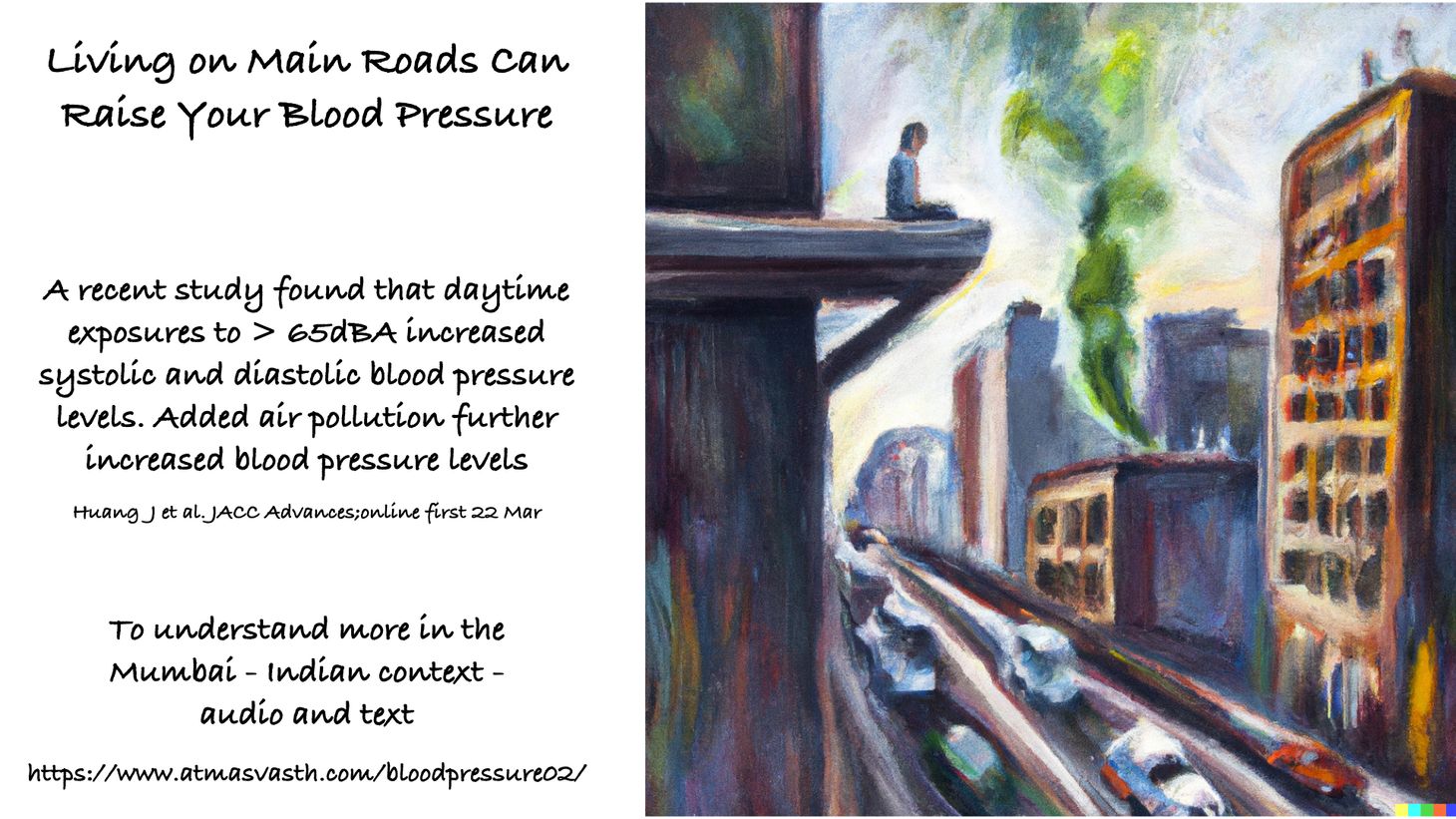Living on Main Roads can Raise Your Blood Pressure
Exposure to road traffic noise and air pollution increases both systolic and diastolic blood pressure

Audio
Text
In June 2021, in my first piece on high blood pressure (defined as anything more than 140 systolic and 90 diastolic, though the cut-offs have been changed to 135/85 recently), I wrote how high blood pressure (HBP) is the single biggest modifiable cardiovascular risk factor causing illness and death. In India, too, it is the single biggest killer, easily outstripping diabetes, cancer and tuberculosis. Approximately 30% of all Indians above the age of 18 have HBP when using the cut-off of 140/90.
Later in the year, starting with an article by Jennifer DSouza and colleagues [1], I wrote how every 10dBA increase in noise is associated with an increase in both systolic and diastolic blood pressures.
To take this research ahead, Dr. Jing Huang and colleagues [2] recently published the results of a prospective UK biobank study on the impact of road traffic noise on blood pressure with and without associated air pollution. They looked at 240,000 people with normal blood pressure at the beginning of the study and then followed them for 8.1 years. In the interim, 21,140 people developed HBP.
The authors found a significant increase in blood pressure for daytime noise levels > 65dBA. This is considered the upper daytime limit in commercial areas in India, with 55 dBA being the upper limit in residential areas. Most people living in buildings on highways and main roads and next to railway tracks are usually exposed to noise levels higher than 65dBA.
When they added air pollution, the numbers worsened. The funny thing is that they took the upper cut-off of PM2.5 as >10.6 μg/m3. In Mumbai, it is rare to ever find PM2.5 levels below 20 μg/m3 and on most days in most parts of the city, they are usually much higher, which means that we are exposed to higher levels of PM2.5 particles than the highest cut-off used in this study.
Look at the triple whammy of living close to highways or main roads or railway tracks in Mumbai. You are exposed to daytime decibel levels more than 65dBA on a regular basis, along with significant air pollution, both of which then contribute to high blood pressure, which in turn requires treatment to mitigate the ill-effects of this silent killer.
The good part is that you can measure your own blood pressure at home, with results comparable to those at the doctor’s clinic. If you are exposed to significant noise and air pollution, it is a good idea, even if you currently have normal blood pressure, to check your blood pressure yourself, once a quarter - two readings in the morning and evening, 1 minute apart, for 3-7 days to see the final average.
The effects of noise and air pollution can be reduced to some extent, if you live on higher floors in a high-rise and install noise-reducing windows and air purifiers in the house…but these only work to some extent and not everyone can do this.
If you are out on the roads, traveling from one place to another, it is anyway difficult to escape either the noise or the air pollution around you. When outdoors, I find using a noise-reducing pair of earphones like the AirPods Pro (30 db reduction in noise) does help in maintaining some form of sanity on our constantly honking Mumbai roads, though masks are unlikely to reduce the impact of the polluted air around us.
While moving out of the city to less polluted parts of the country or moving to a less polluted country is unlikely to be an option for most, perhaps moving residence to a side-road with less traffic or away from the railway tracks could be a solution for some to reduce individual exposure to high road traffic noise.
What does all this mean for you and I?
Regularly measuring blood pressure and controlling it, is important in our atmasvasth quest to live long, healthy. Doctors and the healthcare system can only do so much…it is important that we also take care of our health ourselves and be atmasvasth.
So please measure your own blood pressure yourself. If high, speak to your doctor to institute measures to control it. If borderline high, remember that physical activity, good cardiorespiratory fitness, good sleep, a sensible approach to salt intake, using either potassium-enriched salt substitutes or not adding extra salt while eating or both and whatever measures you can institute to reduce your exposure to noise and air pollution, will go a long way in helping you control your blood pressure, even without medication. If these don’t work, then don’t hesitate to take the medicines your doctor prescribes.
Footnotes
1. D'Souza et al Hypertension. 2021 Dec;78(6):1801-1808. doi: 10.1161/HYPERTENSIONAHA.121.17708. Epub 2021 Oct 25. PMID: 34689591; PMCID: PMC8585701.
2. Huang J et al. Road Traffic Noise and Incidence of Primary Hypertension: A Prospective Analysis in UK Biobank. JACC: Advances 2023;online first 22 Mar 2023;100262
Atmasvasth Newsletter
Join the newsletter to receive the latest updates in your inbox.


